The rollout of E20 fuel in India has sparked concerns among vehicle owners regarding fuel efficiency and performance. Many report mileage drops and engine issues, particularly in non-E20-compliant vehicles. While the government touts economic and environmental benefits, experts emphasize the need for greater consumer awareness and OEM education to mitigate negative impacts.
E20 Fuel: Is India’s Green Push Stalling on the Road?
India’s ambitious plan to roll out E20 fuel – gasoline blended with 20% ethanol – across the nation has hit a few potholes. While the intentions behind this initiative are undeniably commendable – reducing reliance on imported crude oil, lowering carbon emissions, and boosting the agricultural sector – the actual experience for many car owners hasn’t been a smooth ride.
The government’s push for greater ethanol blending is undoubtedly a step towards a greener future. Ethanol, primarily derived from sugarcane molasses and other agricultural feedstocks, is a renewable fuel source. Increasing its proportion in gasoline promises to shrink our carbon footprint and lessen our dependence on volatile global oil markets. But are we ready for it?
Mileage Woes and Engine Concerns: The Reality of E20
Many drivers report a noticeable dip in fuel efficiency after switching to E20. Several users on social media platforms and automotive forums have voiced concerns, stating that they are experiencing a reduction in mileage ranging from 10% to 15%. This decrease, while potentially dependent on driving habits and vehicle type, is a significant factor for budget-conscious consumers already battling rising fuel prices.

Beyond mileage, some worry about the potential long-term effects of E20 on engine health. Ethanol is known to be corrosive, and while manufacturers claim that E20-compatible vehicles are built with materials that can withstand its effects, anxieties persist. Concerns focus on potential damage to rubber and plastic components within the fuel system, leading to leaks or other malfunctions. It is important to Despite the reported challenges, the E20 initiative remains a crucial step towards a more sustainable future for India. The potential benefits in terms of reduced emissions and decreased dependence on foreign oil are substantial. However, the transition requires careful management and ongoing monitoring. Addressing consumer concerns regarding mileage and engine performance is vital to ensure the long-term success of the program.
Continued research and development are crucial to further optimize engine technology and fuel blends, mitigating any adverse effects on vehicle performance. Investing in infrastructure for ethanol production and distribution is equally important to ensure a stable and reliable supply of E20 fuel across the country. Perhaps advancements in flex-fuel engine technology, which allows vehicles to run on varying blends of gasoline and ethanol, could provide a more versatile and consumer-friendly solution in the future.
Ultimately, the success of the E20 rollout hinges on a collaborative effort involving the government, automakers, fuel producers, and consumers. Open communication, proactive solutions, and a commitment to continuous improvement will pave the way for a greener and more energy-secure India.







